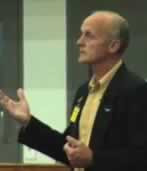As we near the point of an "official" launch of something I set into motion over ten years ago, I feel it important to establish what this "Return To Honor" concept is all about. It's about people, essentially, and how to begin respecting one another even though we might not agree with each other about politics, culture, religion or other important things. What is important is that we at least make an effort to understand cultural differences, and causes of ill behavior rather than reacting to the outward symptoms.
What makes me an expert on the subject? I'm not...but for 2 1/2 years I was an inmate in the federal prison system where I learned first-hand the best...and worst...lessons in human behavior, from people on BOTH sides of the fences and walls. I discovered that freedom is not a physical thing, but is emotional and psychological. I learned more about personal freedom from long-time inmates than I ever learned on the outside...and I've observed more people in prisons of their own minds on the outside than I did those who were actually locked up in prisons and jails. I laughed harder, cried more and felt more deeply about common human frailties, avarice and heroism on the inside of prison walls and jail cells than I have anywhere else, before or since.
The Return To Honor program was conceived at a time when my eyes, heart and mind first started to open to what really causes criminal behavior...and more importantly, what keeps it going...and its concept is simple but profound. With even a modicum of respect for one another, no matter what one's personal history may be, we can make a measurable difference in criminal behavior that will have a ripple effect on every strata of American...and even global...society. Crime doesn't happen because people are innately criminal. It happens because we don't address the causes of crime. Instead, we react to it out of fear, ignorance and indifference...and we inflame it with racial and social prejudice and favoritism. No matter how "fair" we might think ourselves to be as a nation, we have created a correctional system that is anything but fair. It's an incubator system where crime only begets more crime...and woe be it to anyone who enters it thinking otherwise. As individuals, some of us might make it through unscarred and untainted, but rarely "corrected."
My comments and my views are not pointed at anyone in particular, nor as an outcry against "the system." It's what it is because we have allowed it to evolve the way it has. My respects to those who work in the justice, law enforcement and correctional systems. They have a horrendous job to do, which only gets harder and more complex as we continue to ignore the simplest approaches to human beings who have made mistakes. Some are incorrigible, granted. But the majority can and want to change. They just don't know how, where to begin or whom to trust. My contention––and it's been confirmed by many hundreds of people on both sides––is that we must be stern and resolute in correcting criminal behavior, but we must be willing to understand the causes and treat those. We do that with respect...and with common-sense approaches to creating bridges back "home" for those who have erred...many of whom never knew anything better.
In so doing, perhaps we can all "return to honor" as a nation of intelligent, compassionate people who take care of their own. With over two million men, women and children locked up somewhere in this country, every one of them someone's father, brother, mother, sister, aunt, uncle or cousin, they ARE "our own." Statistically, each one of them affects five to ten other people, so you can rest assured that any meaningful attempt to assist any of them in their successful return home WILL make a measurable difference for all of us.
More to come.
Don Kirchner
